Fleeing Dunkirk: A 1940 holiday in hell
- Published
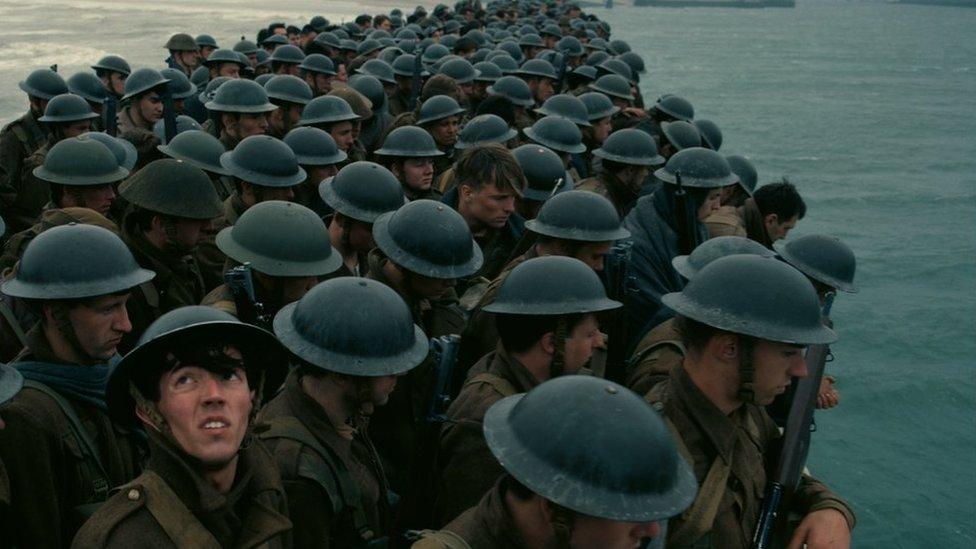
The film Dunkirk tells the story of British and Allied troops trapped on the beach surrounded by enemy forces in 1940
Christopher Nolan's World War Two thriller Dunkirk hits the screens in the US and the UK this month, dramatising the daring rescue of 300,000 Allied troops from the approaching German army.
But as they escaped across the English Channel, thousands of civilians were left to fend for themselves. This is the story of one family.
It was May 1940 and Eva Zusman, her husband Stanislas and four-year-old daughter Anita had arrived in the Belgian beach resort of De Panne from their home in Antwerp.
They were joined by Stanislas's father and close family. It was a holiday arranged at the last minute to celebrate Eva's return from her hometown of Geneva, where she was visiting her family.
German advance
De Panne was ideal for a family summer holiday. White sandy beaches stretched as far as the eye could see.
But the day after their arrival on 10 May, Germany invaded Belgium, Luxembourg and the Netherlands. For Anita - who is now 80 and living in Geneva - the news came from a local police warden carrying a drum.
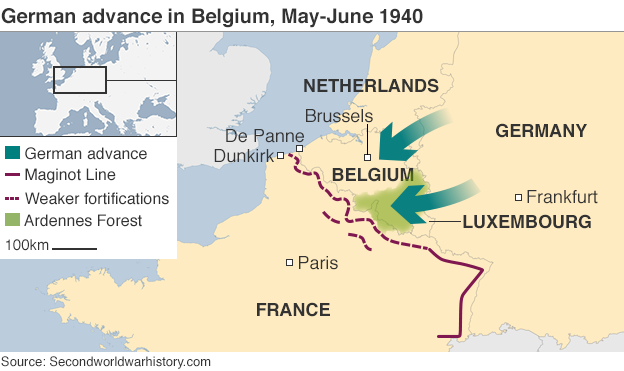
Belgium's resistance did not last long. Thousands of Nazi troops were marching across the Low Countries towards northern France and the coast.
Eva and Stanislas hesitated, aware that as Jews they would be among the first to be targeted in occupied Belgium. After several days they joined others making their way on foot towards France.
The pace was slow. Born with a deformed hip, Eva limped heavily while her father-in-law, Abraham, needed a wheelchair. Anita and her cousins, at first terrified of what was happening, were soon distracted by views of the sea and ran ahead.
Stanislas bought a car and hired a young local man to drive the Zusman family towards the border. Once in France, they stopped at a guesthouse to rest.
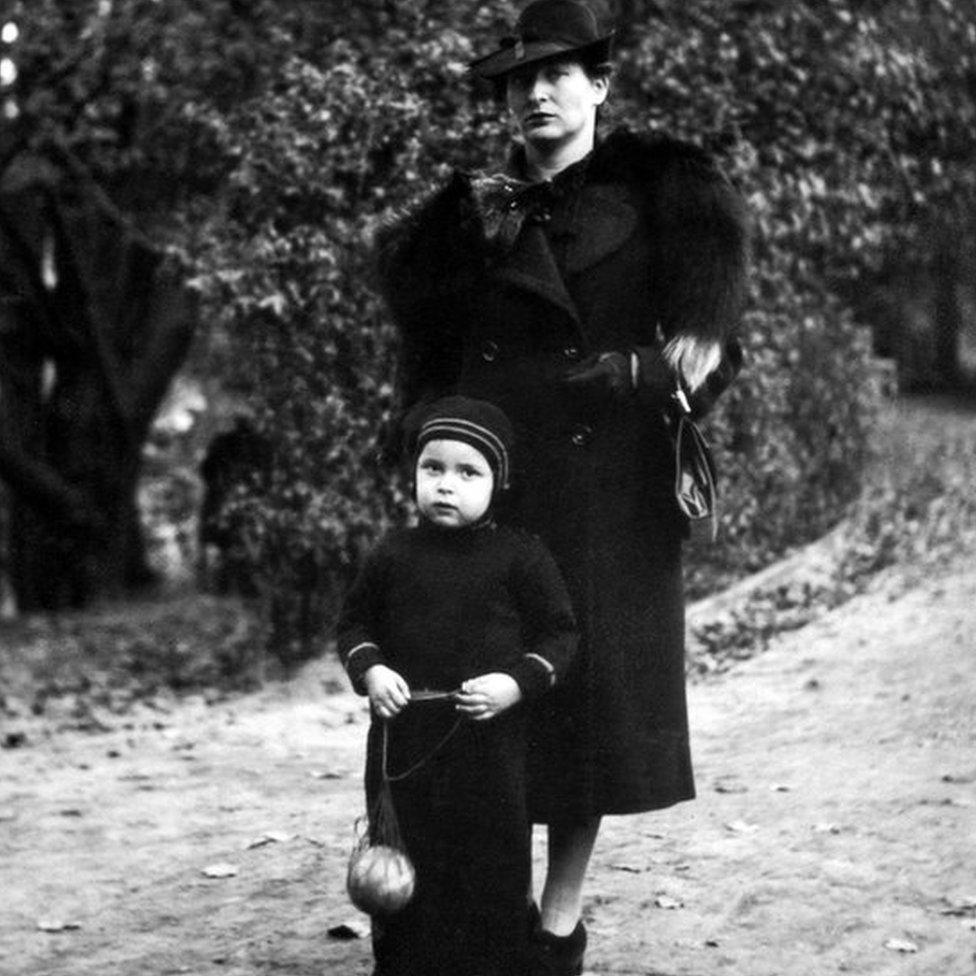
Eva, with little Anita, in the fur coat that would become a lifeline when they lost most of their possessions
They left their suitcases in the car and paid for their driver to spend the night at the guesthouse with them. In the morning they were to continue their journey south. Eva would not be separated from the fur coat that she had bought in Geneva the previous winter. It was to accompany her every step of her journey.
In the morning both car and driver had disappeared. Their only means of transport and their belongings had gone.
Dunkirk under siege
By 15 May the Netherlands had surrendered to Germany and the Zusman family were on their way to Dunkirk.
When they arrived days later, the city felt unnaturally quiet. Bomb explosions could be heard in the distance and smoke was visible to the north. Eva searched for provisions and a place to stay, and found both in a farmhouse on the outskirts of the city.
What happened in Dunkirk was to haunt Eva for many years after the war and she wrote down her memories in her diary.
"We didn't know that the entire British army was back in Dunkirk as they were trying to escape back by the sea. We spent a terrible night under bombardment in Dunkirk, we didn't know what awaited the soldiers on the beach. Stanis thought we should board one of the boats heading to England too."
By 21 May, British, French and Belgian troops were in effect trapped along the French coast.
A French division had held the Germans near Lille and given the Allies time to gather in Dunkirk, but time was running out. Prime Minister Winston Churchill had called for small private boats and ships to gather along the coast to take part in the evacuation.
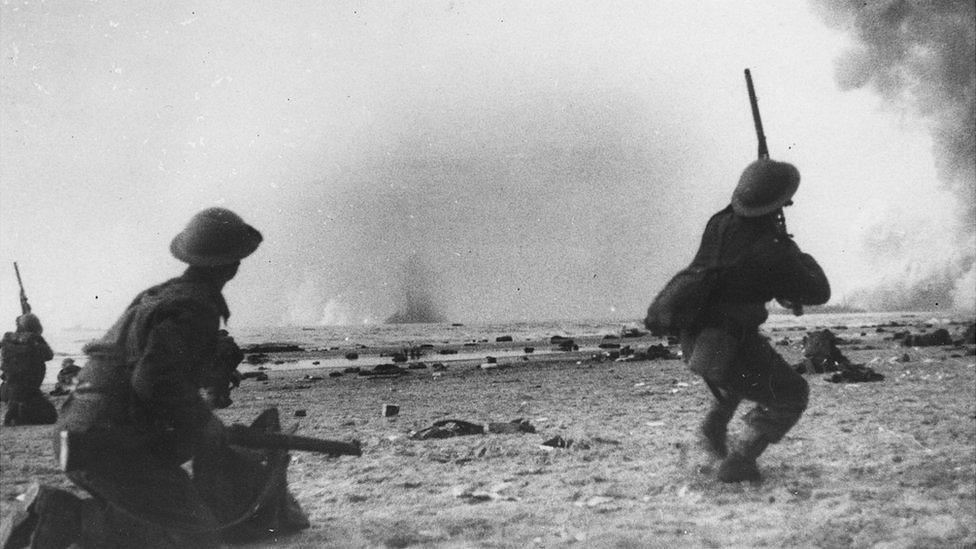
German bombers pounded British troops stuck in the open on Dunkirk beach
Escape from Dunkirk
Stanis and his family joined other civilians fleeing the bombardment. They headed south-east, hoping for a train to take them away from the fighting.
Bikes, carts, horse-drawn carriages, trucks, prams, young and old, women and children fled south in whatever way they could.
Nobody knew how long the journey would last or where they would spend the night. More than 20,000 civilians were to lose their lives in France in May and June 1940.
Anita still remembers the warmth of her mother's fur coat. She slept on it and covered herself with it when it was cold at night. It became more of a treasure than Eva could have ever imagined.
Then came the separation.
Stanis decided to buy a motorcycle with a sidecar.
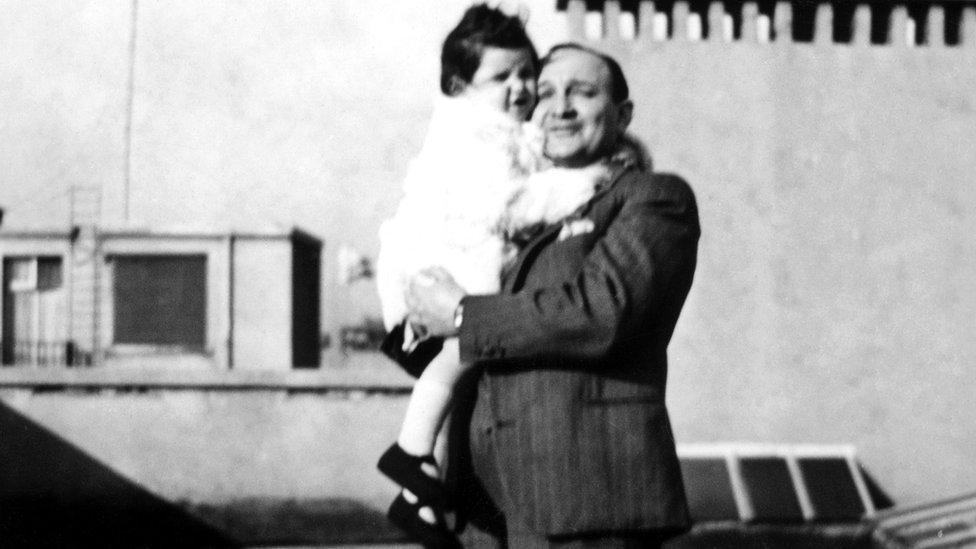
Anita with her father in 1939 - they would become separated as they fled the German advance
A young man was found to drive it and Eva was to go in the sidecar with her daughter, while Stanis would follow with his father and his brother's family. Their aim was to head south to Lyon, from where they thought they would take a train.
The journey was slow because of the crowds of refugees. Eventually the petrol ran out and mother and daughter continued on foot.
Even now Anita remembers the hunger. They went for days with little or nothing to eat, sometimes buying bread and vegetables from locals. Eva wrote in her diary:
"I will never forget a farmer who gave me an egg for Anita and a lady who wanted to snatch it from me to give it to her elderly husband. I kept it for Anita, I was able to boil it, she ate it very happily and she vomited it straight away."
Under attack
Most people on the roads slept under trees and in the bushes, but Eva hoped for a safer place.
One night she knocked on the door of a farm, asking for food and a place to sleep. But the farmer was overwhelmed by the number of refugees on his doorstep.
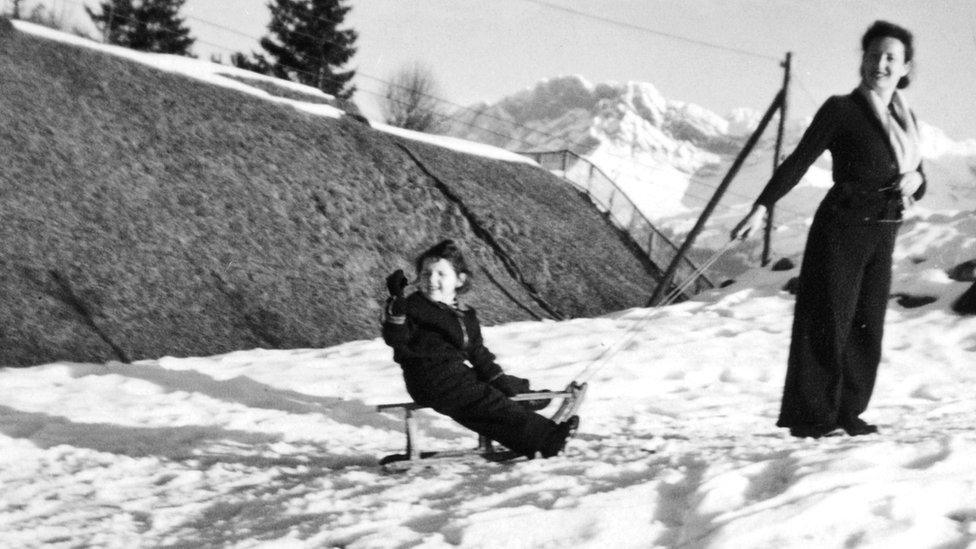
Anita and Eva in happier times in Villars, Switzerland, months before they were forced to become refugees
Turned away, they sheltered in nearby fields and awoke to the siren of an approaching German Stuka dive-bomber.
Stuka bombers terrified the local population at this time, their sirens a warning of imminent attack. Eva watched the plane dive as it approached its target, its machine-gun spraying bullets everywhere. Then it dropped a bomb and the farm went up in flames.
Eva and Anita ran as far as they could, to escape the heat of the flames, and the danger that the fire would spread to the dry fields nearby.
Eva threw herself on the ground, trying to cover Anita with her own body. What would happen to her child if she died, she thought. It would be better if they died together.
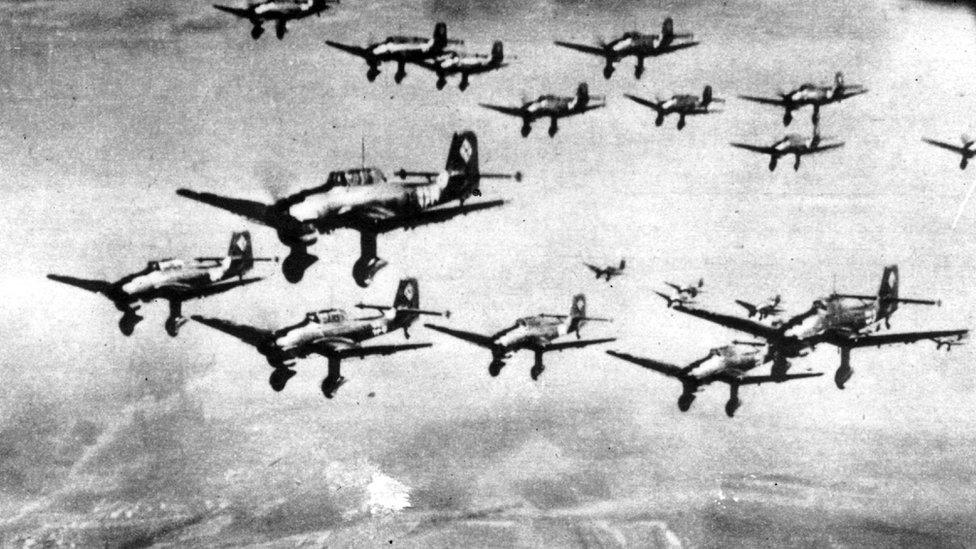
Stuka dive-bombers terrified civilians in the Nazis' 1939-1940 Blitzkrieg
The German checkpoint was barely visible, as so many people were attempting to get through.
Face to face with the invaders
Long lines of trucks, carriages and those on foot had found their journey brought to an unexpected stop. Eva had heard rumours that the Germans were coming. But no-one realised that the occupying army was already everywhere.
At the checkpoint Eva came face to face with the first Nazi soldier she had ever seen. Unsure how to address him, she decided on German, to do everything in her power to get herself and her daughter out of the French fields and back to the Belgian capital, Brussels.
While Eva had been talking, Anita had been picking daisies and came to her mother's rescue. She handed him the bunch of flowers she had picked and remembers the scene to this day.
"He took me in his arms with the flowers, and told my mother that he had a daughter my age at home. He asked us where we came from and what he could do to help. When my mother said Switzerland, he laughed."
There were no open roads into neutral Switzerland, but he did help get them to Brussels.
As the rest of the queue looked on in envy, Eva and Anita got into a chauffeur-driven German Volkswagen and were taken to Brussels. After six weeks on the road they were finally reunited with Stanis.
The Zusmans returned to their lives in Belgium, but as anti-Semitic laws intensified in Brussels, Anita was put on a Red Cross train to Switzerland, and was followed by her mother.
Stanis tried to join them but was caught and eventually murdered by the Nazis at Auschwitz in February 1943.
Nadia Ragozhina is a distant cousin of Eva Zusman and is working on a book on her family's past through the 20th Century.
- Published12 July 2017
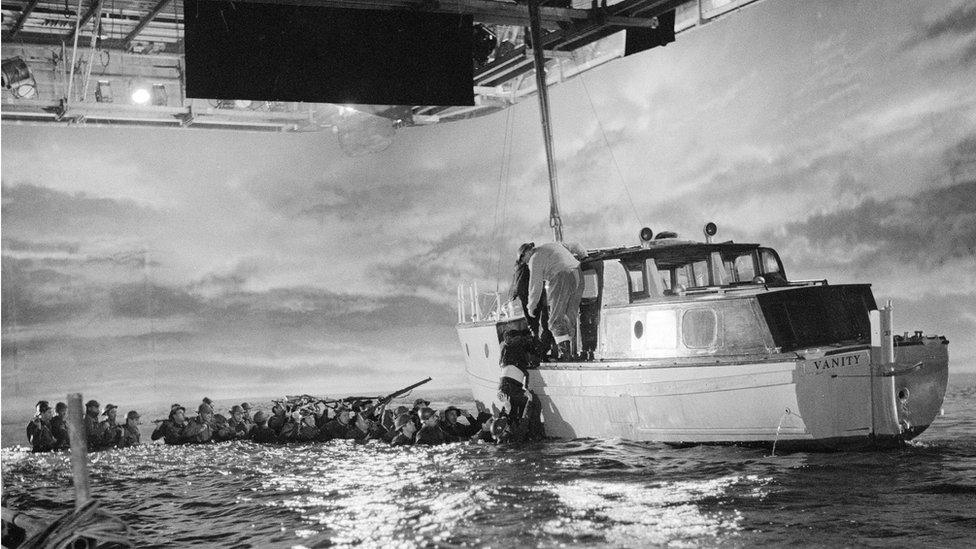
- Published27 May 2010